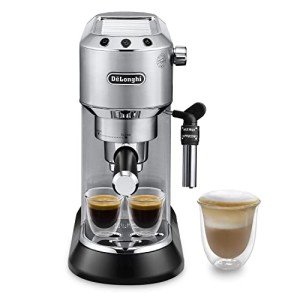The Secret Life Of Energy-Efficient Espresso Machines
Energy-Efficient Espresso Machines: A Comprehensive Guide
On the planet of coffee enthusiasts, espresso machines are frequently considered as vital devices for brewing rich, fragrant coffee. However, the energy usage related to these machines can result in increased utility costs and ecological concerns. As customers become more eco-conscious, energy-efficient espresso machines have actually emerged as a popular choice. This post aims to check out the functions, benefits, and options available in energy-efficient espresso machines, helping coffee enthusiasts make informed options.
What Makes an Espresso Machine Energy-Efficient?
Energy-efficient espresso machines are developed to reduce energy usage while maintaining ideal efficiency. A number of functions add to the energy performance of these machines:
Insulation: High-quality insulation helps maintain heat, reducing the energy needed to preserve ideal developing temperature levels.
Smart Technology: Many modern machines are geared up with programmable settings that enable users to schedule brewing times and switch to standby mode when not in use.
Quick Heat-up Time: Energy-efficient espresso machines often use innovative heating innovations, such as thermoblocks or PID controllers, to heat water rapidly.
Low Wattage: Machines that run at lower wattages consume less energy overall, making them more efficient.
Vehicle Shut-off: Automatic shut-off includes make sure that the machine switches off after a certain duration of inactivity, more minimizing energy waste.
Advantages of Energy-Efficient Espresso Machines
Purchasing an energy-efficient espresso machine can offer numerous advantages:
Cost Savings: Over time, lower energy consumption can lead to decreased electrical power bills.
Environmental Impact: Using less energy minimizes carbon footprints, making these machines a more sustainable option for environmentally conscious consumers.
Improved Performance: Many energy-efficient models likewise offer superior brewing innovations, leading to better-tasting espresso.
Durability: Typically, energy-efficient machines are built with high-quality elements, leading to higher longevity.
Features to Consider
When choosing an energy-efficient espresso machine, numerous features need to be taken into consideration:
- Type of Machine: Options include manual, semi-automatic, and fully automatic models, each with differing degrees of user control and automation.
- Brew Quality: Look for machines that utilize high-quality developing systems to ensure optimum flavor extraction.
- Maintenance: Some machines have self-cleaning features that can save energy and effort in upkeep.
- Capability: Depending on personal or household size, machine capacity can affect energy intake, with larger machines typically needing more power.
Popular Energy-Efficient Espresso Machines
The marketplace uses a range of energy-efficient espresso machines accommodating various needs and preferences. Below are some noteworthy designs:
Brand
Model
Secret Features
Energy Consumption
Breville
Barista Express
Integrated grinder, PID temperature control, fast heat-up.
Low
DeLonghi
EC155
Compact size, simple to use, durable build.
Moderate
Rancilio
Silvia
Sturdy design, outstanding temperature stability, and has a low ecological impact.
Moderate
Gaggia
Traditional
Trustworthy manual operation, durable brass components, and efficient steaming capability.
Low
Jura
E8
Totally automatic, clever functions, and a detachable brew group for easy cleansing.
Low
Tips for Optimal Energy Efficiency
Aside from picking an energy-efficient model, consumers can adopt numerous practices to make the most of energy effectiveness:
- Preheat: If your machine has a pre-heating function, use it to ensure that the optimal temperature level is reached rapidly before developing.
- Shut off After Use: Always switch off the machine after developing or use machines with automobile shut-off features.
- Regular Maintenance: Keep the machine properly maintained to guarantee it runs effectively and effectively.
Frequently Asked Questions About Energy-Efficient Espresso Machines
1. Are energy-efficient espresso machines more costly?
While the preliminary investment may be greater for energy-efficient designs, the long-lasting cost savings on electrical power expenses can offset the initial cost. Furthermore, numerous energy-efficient machines featured advanced features that enhance the brewing experience.
2. How do Best Espresso Machines understand if an espresso machine is energy-efficient?
Search for indicators such as Energy Star accreditation, user reviews, and specifications relating to wattage and heat-up time. Machines with particular features focused on reducing energy intake are usually created for better effectiveness.
3. Can I use an energy-efficient espresso machine for other coffee styles?
Numerous energy-efficient espresso machines offer flexibility, enabling users to brew different coffee designs beyond espresso, such as lattes and cappuccinos, by including steaming capabilities.
4. Do energy-efficient models compromise quality for efficiency?
Not always. Numerous energy-efficient espresso machines are geared up with high-quality developing innovation that can improve taste extraction while decreasing energy consumption.
5. What maintenance is required for energy-efficient espresso machines?
Routine upkeep includes cleaning up the machine, descaling when required, and periodically examining seals and gaskets to make sure optimal efficiency and energy performance.
Energy-efficient espresso machines represent an ideal mix of efficiency, cost savings, and ecological obligation. By thinking about different functions, benefits, and brands, customers can choose a model that fits their distinct choices while contributing positively to the environment. As the trend toward sustainable living grows, the popularity of energy-efficient devices, consisting of espresso machines, is most likely to continue its upward trajectory, providing coffee enthusiasts a guilt-free method to enjoy their daily dose of espresso.
